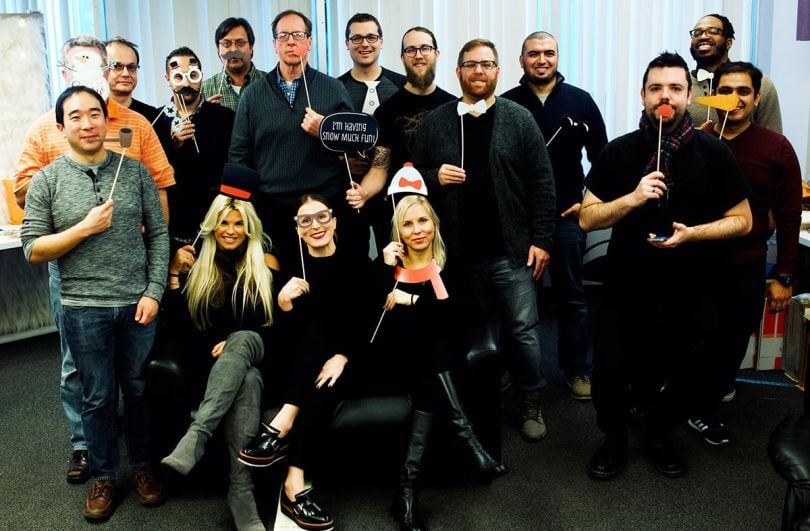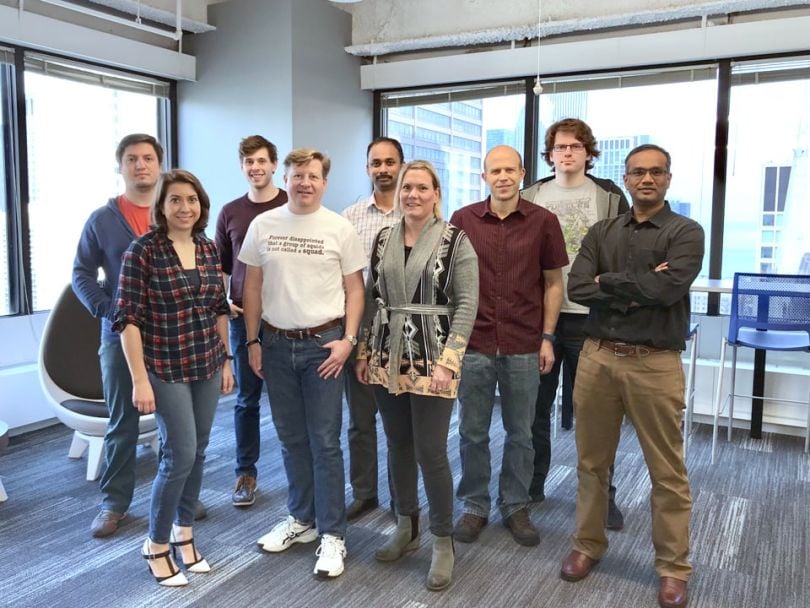Ever find yourself lost in a coding project, the hours flying by as you try to figure out how different parts fit together until everything suddenly just clicks?
Whether it’s about the challenges, the new skills they picked up or the results they achieved, many developers have fond memories of their favorite projects. We spoke with members of four Chicago tech companies to learn more about the most interesting things they’ve worked on, and what they learned from them.

Founded by industry veteran Raymond Hicks, 5thColumn is a Chicago-based cybersecurity firm that specializes in data security and threat protection for government agencies and Fortune 500 companies alike. Linux systems administrator Sam Wallinga said one of his biggest priorities this year has been to automate many of the company’s workflows. In addition to lining up with his love for automation, Wallinga said the work has helped him think more holistically about coding.
What has your favorite project at 5thColumn been?
Our ongoing initiative to automate as much of our infrastructure as possible. We’re a pretty small team, so being able to deploy new systems and applications on demand with just a few clicks is huge. Currently we’re leaning heavily on Ansible, Jenkins and Terraform to deploy to our private OpenStack cloud. We’re also laying the foundation for some really exciting microservice orchestration efforts with various Docker tools.
I love automation. If I have to do something manually more than a couple times, you can bet I’ll try to script it. Applying it at scale and seeing everything come together is seriously cool.
How has that project helped you grow as a developer?
I’ve grown a ton since joining the efforts to move toward infrastructure-as-code. From an architecture and design standpoint, I’ve developed the vocabulary to describe systems and applications in a generic sense, making it worlds easier to create “recipes” for entire stacks of applications. On the actual implementation side, I’ve adopted a mindset of “uncompromising modularity” — that is, making sure that what I build today will still play nice with the automation tools of tomorrow. This means writing clean, testable, well-documented code, with nothing hard coded, ever — and version controlling everything.
More generally, I’m learning something new every day as we build and refine our platform to respond to changing needs. A huge perk of our small team size is that we can be language- and tool-agnostic, with freedom to explore and truly find the right tool for the job (though we all share a fondness for Python!). Just because we’re using $STACK today, that doesn’t mean it’ll be the right choice next week!

An online booking platform for hotels around the world, Rocketmiles lets users receive airline miles and other rewards for reserving stays through their platform. Senior software engineer Tyler Barber leads the development of a tool that lets consumers use the same login for Rocketmiles and its airline partners. Barber said the project has given him an opportunity to learn a new language and to explore the tech stacks used by other organizations.
What has your favorite project at Rocketmiles been?
My favorite project, and the one I currently lead development on, is an identity provider we built for managing single sign-on sessions with some of the airline partners we work with. We're constantly growing the number of airlines using this platform, so I get an opportunity to interact with a lot of different folks from each of their airline reward programs.
In my year at Rocket, I've helped launch hotel platforms for four different airlines, and that number is growing. Beyond that, this is the first time where my end users are people outside of the company I work for. I'm helping build something that I can show my friends and family, and that they can use as well. That, for me, is very fulfilling.
How has that project helped you grow as a developer?
The biggest point of growth for me came from the fact that the project was written in Kotlin, a fairly new language by JetBrains. Picking up a new language that still felt reasonably familiar because it runs on the JVM and contributing quickly to the project when I started last year was a fun challenge. Since the language is so new, we're doing a lot of things not many people have done with it. For example, we've built a few AWS Lambda functions in Kotlin that we use to provide miles to some of our users.
Beyond that, most of the team who works on this project is fully remote. There's an entire skill set you need for working as a distributed team that I just didn't have before. Building up some industry knowledge on how airline rewards programs work and what their tech stacks look like has been pretty valuable too.

Legacy.com’s technology powers the obituary sections of more than 1,500 newspapers and 3,500 funeral homes around the world. One of the company’s recent tech additions was a feature that lets a user sign up to get automated notifications when new obituaries are posted in their community. Web developer Todd Mandell said working on that feature was an exciting challenge, because it allowed him to explore new frameworks and dive into the nuances of Legacy’s tech ecosystem.
What is your favorite project you've worked on at Legacy.com?
Legacy identified a need to add a new component for our newspaper partners’ co-branded sites that allowed users to sign up and receive email notifications when new obituaries were posted to that specific newspaper. This was a fun project because it allowed me to touch a number of different aspects in our ecosystem, including responsive rendering using some modern and cutting-edge technologies like React, Redux and GraphQL.
How did that project help you grow as a developer?
Legacy has a fairly complicated algorithm for determining where and how we will render obits and ads, and it is also configurable by one of our services. Breaking down this algorithm so I could modify it and insert new components into the flow was a really fun challenge. I already had a good amount of experience with React, but this also gave me some experience using it in a more complicated situation.

Whether you do your shopping online or in a brick-and-mortar store, odds are you rely on your phone or computer to look up information about the products you buy. ItemMaster works with retailers and manufacturers to make sure that information is accurate and up to date. The company is currently redesigning the portal used by manufacturers to upload new information. Joshua Duncan, Senior Developer, said that project has given him an opportunity to think creatively in order to overcome the limitations of web-based technology.
What has been your favorite project at ItemMaster been?
We're taking the UI of the manufacturer portal for our content network from old-school data entry screens to responsive, media-rich web pages. Seeing the immediate results of my front-end work there is a very rewarding feedback loop. At the same time, the platform can't sit still. Improving and extending our existing tech stack while creating entirely new components has been an enjoyable mix of work.
How has that project helped you grow as a developer?
Despite being the only universal technology platform available today, the web isn't without its bumps and cracks. Even with languages like TypeScript, working around the limitations of the technology can sometimes be an exercise in very creative thinking.
You may feel like Thomas Edison finding all the ways it won't work, but the good news is that there's always a solution. In the end, it's rewarding when you develop a product that creates new opportunities for your customers.









